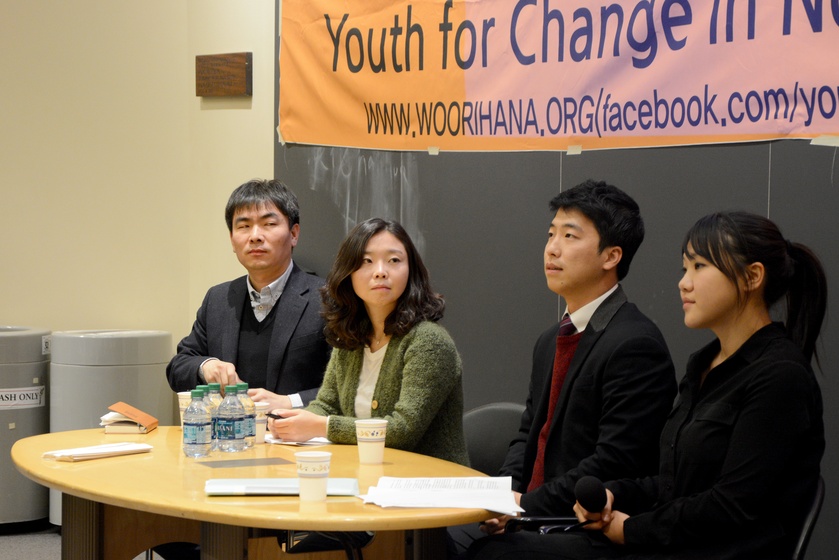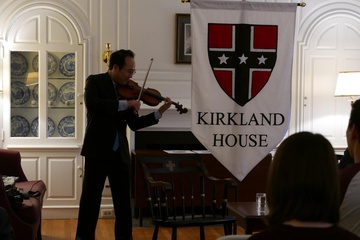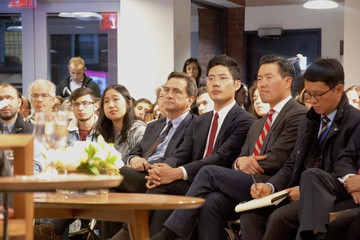Korean and English syllables mingled in the air, bearing solemn memories of hardship at times and signalling hope for change at others. The overall mood in Ticknor Lounge was light and conversational, but the evening’s subject was serious: life in, and escape from, North Korea.
The event, “North Korea Information Highway: Driving Change in North Korea,” featured three defectors from North Korea, a country that many argue has an oppressive government. The student organization Harvard Human Rights in North Korea co-hosted the event with a Korean human rights group, Woorihana: Youth for Change in North Korea. The event started with a speech from all three guests, continued with a question and answer session, and concluded with a reception.
{shortcode-fd2a815b448bcec07c37c994bffc6a280fec70bb}
An audience of over 50 students listened to Eun-ju Kim’s story of hardship and escape. She described her experience witnessing public executions and her father’s death from starvation. Kim defected twice, first to China and then to South Korea.
“I usually say I had a difficult life through China to South Korea,” she said in an interview after the event. “However, my story is one of the normal stories...I mean, yeah, there are extremely good cases and there are some extremely bad cases, but my case was normal.”
Gwang Seong Jung was the next defector to speak. Jung approached his speech with a little levity. “In North Korea, they teach you to hate America, and so we don’t learn English. But we think Russian is very important,” he said with a good-natured chuckle.
Jung also recalled his excitement when he first arrived in the airport in Seoul, South Korea—his parents had arranged his escape through a broker. “I thought it was heaven,” he said.
The third and final speaker, Se Jun Park, a middle-aged doctor who now resides in South Korea, spoke about his education in North Korea during a question and answer session after the event. “After graduating from high school, I went to the military and my mind was set,” he said. “I was going to fight the U.S. And, who knows, maybe one day I could have fought you.... [But] once I left North Korea...my perceptions [had] really changed. And I realized how the government educated us and brainwashed us.”
In his speech, he claimed that there are two sorts of poverty at work in North Korea as a result of the government. The first follows the more conventional definition of economic hardship and starvation. The second is what he calls “intellectual poverty,” which stems from North Korea’s isolation from the outside world. Park outlined his initiative to smuggle USB drives loaded with media content into North Korea in order to alleviate intellectual poverty.
Park fixated on the North Korean fascination with South Korean pop culture. He emphasized that he often loads USB drives loaded with South Korean soaps and movies.
During an interview later in the evening, Park said through a translator that one of his primary intentions was to stimulate “cultural connections.” His organization also adds books, newspapers, and texts promoting free-market economics to the USB drives.
During the reception, Kim prepared Korean treats. She also spoke about the importance of personal stories. “People know North Korea has no human rights, people know they don’t have enough food. But they don’t know what that means. We need to let people know exactly what’s happening through our own stories.”
Kim hoped that the stories shared that night might inspire some to engage in activism in Korea. “We cannot expect the whole audience after hearing our story to be [involved] in the activities of human rights in North Korea,” Kim said. “We cannot expect that....If there is one [person moved by this event], I believe it is a success. One can be 10 later.”
Park sought input from the audience about how smugglers might counteract anti-American propaganda in North Korea. “What kind of content or what kind of media do you think that we could show North Koreans [so that they can] understand...American people?” he asked.
An audience member recommended old sitcoms like “The Brady Bunch.”
— Josiah B. Corbus





